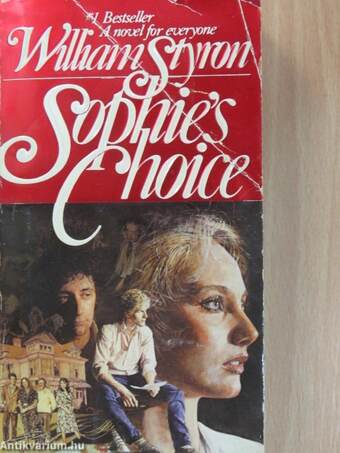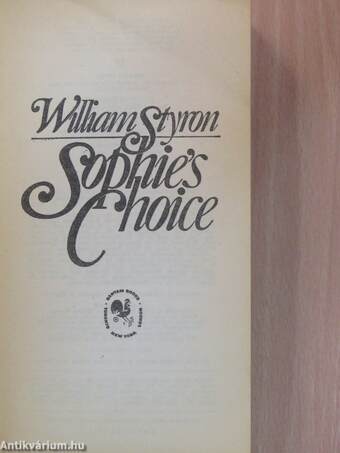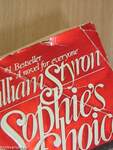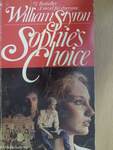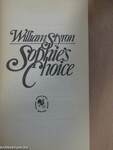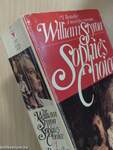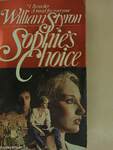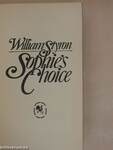1.063.261
kiadvánnyal nyújtjuk Magyarország legnagyobb antikvár könyv-kínálatát

VISSZA
A TETEJÉRE
JAVASLATOKÉszre-
vételek
Sophie's Choice
| Kiadó: | Bantam Books, Inc. |
|---|---|
| Kiadás helye: | New York |
| Kiadás éve: | |
| Kötés típusa: | Ragasztott papírkötés |
| Oldalszám: | 626 oldal |
| Sorozatcím: | Bantam Books Novel |
| Kötetszám: | |
| Nyelv: | Angol |
| Méret: | 18 cm x 11 cm |
| ISBN: | 0-553-13545-7 |
naponta értesítjük a beérkező friss
kiadványokról
naponta értesítjük a beérkező friss
kiadványokról
Előszó
One
in those days cheap apartments were almost impossible
to find in Manhattan, so I had to move to Brooklyn. This
was in 1947«, and one of the pleasant features of that
summer which I so... Tovább
Előszó
One
in those days cheap apartments were almost impossible
to find in Manhattan, so I had to move to Brooklyn. This
was in 1947«, and one of the pleasant features of that
summer which I so vividly remember was the weather,
which was sunny and mild, flower-fragrant, almost as if
the days had been arrested in a seemingly perpetual
springtime« I was grateful for that if for nothing else* since
my youth, I felt, was at its lowest ebbc At twenty-two,
struggling to become some kind of writer, I found that the
creative heat which at eighteen had nearly consumed me
with its gorgeous, relentless flame had flickered out to a
dim pilot light registering little more than a token glow in
my breast, or wherever my hungriest aspirations once
resided. It was not that I no longer wanted to write, I still
yearned passionately to produce the novel which had been
for so long captive in my brain« It was only that, having
written down the first few fine paragraphs, I could not
produce any others, or—to approximate Gertrude Stein's
remark about a lesser writer of the Lost Generation—I
had the syrup but it wouldn't pour. To make matters
worse, I was out of a job and had very little money and
was self-exiled to Flatbush—like others of my country-
men* another lean and lonesome young Southerner wan-
dering amid the Kingdom of the Jews.
Call me Stingo, which was the nickname I was known
by in those days, if I was called anything at all. The name
derives from my prep-school days down in my native state
of Virginia. This school was a pleasant institution to which
I was sent at fourteen by my distraught father, who found Vissza
Fülszöveg
Over 40 weeks
^jpliksQioia
This is the story of the extraordinary Sophie and
her men. Nathan, the demonic\ brilliant Jew, full
of charm and rage. And Stingo\ the loneliest,
homiest^ would-be writer^ in New_ York_
^phks0me
Once or twice in a generation an astonishing novel
reminds us of the staggering and beautiful experi-
ence we can find in the best of fiction. Sophies
Choice\ is that kind ofnovel. It is a novel of ecstasy,
oferoticpassion. It takes us back through a past that
Sophie alone survived—until we reach, finally; the
electrifying; terrible secret—Sophie's Choice.
hksQwke
A stunning work a triumph A dazzling;
gripping book."—Chicago Sun-Times
Témakörök
- Idegennyelv > Idegennyelvű könyvek > Angol > Szépirodalom > Regény, novella, elbeszélés
- Szépirodalom > Regény, novella, elbeszélés > Az író származása szerint > Amerika > Amerikai Egyesült Államok
- Szépirodalom > Regény, novella, elbeszélés > Tartalom szerint > Történelmi regények > Koncentrációs táborok, holokauszt
- Szépirodalom > Regény, novella, elbeszélés > Tartalom szerint > Lélektani regények
- Szépirodalom > Regény, novella, elbeszélés > Tartalom szerint > Filmregények



